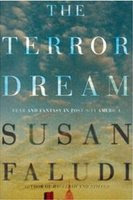 If you’re a New Yorker reading Susan Faludi’s The Terror Dream: Fear and Fantasy in Post-9/11 America, you can’t help but relive those first few days. So my question while reading it so far is this: Where do we draw the line between private expression and public expectation, between personal, psychological response and national script?
If you’re a New Yorker reading Susan Faludi’s The Terror Dream: Fear and Fantasy in Post-9/11 America, you can’t help but relive those first few days. So my question while reading it so far is this: Where do we draw the line between private expression and public expectation, between personal, psychological response and national script?
I was among that “mob of idle Good Samaritans,” as Faludi calls it, who was turned away for blood donation. The profound sense of impotence after the towers fell — it wasn’t just a narrative script, it was a deeply felt emotion. (And the firefighters, as I don’t think Faludi would negate, were heroes. I was living below 14th Street at the time, and I’d burst into tears on my morning runs through the frozen zone when I’d see their white-dust-covered engines drive by. For weeks, you couldn’t walk past a fire station, invariably flanked by a make-shift memorial of candles and wreaths, without weeping. It’s just how it was.)
I was also one of those women who got engaged soon after 9/11 in part out of the carpe diem spirit that overcame both my partner and me. Did we take refuge in the domestic, or did we follow our hearts?
Six years later (and one husband down), I’m still not sure that I could write neutrally about 9/11. Faludi is one of my favorite cultural critics, and, as to be expected, she does it well. So I’m not sure if my lingering question comes as the question of someone who still feels too close, or if it’s a larger critique. I’ll let you know when I finish the book! For now, I’m feeling a little un-ironic. Then again, perhaps that’s exactly her point.


Comments